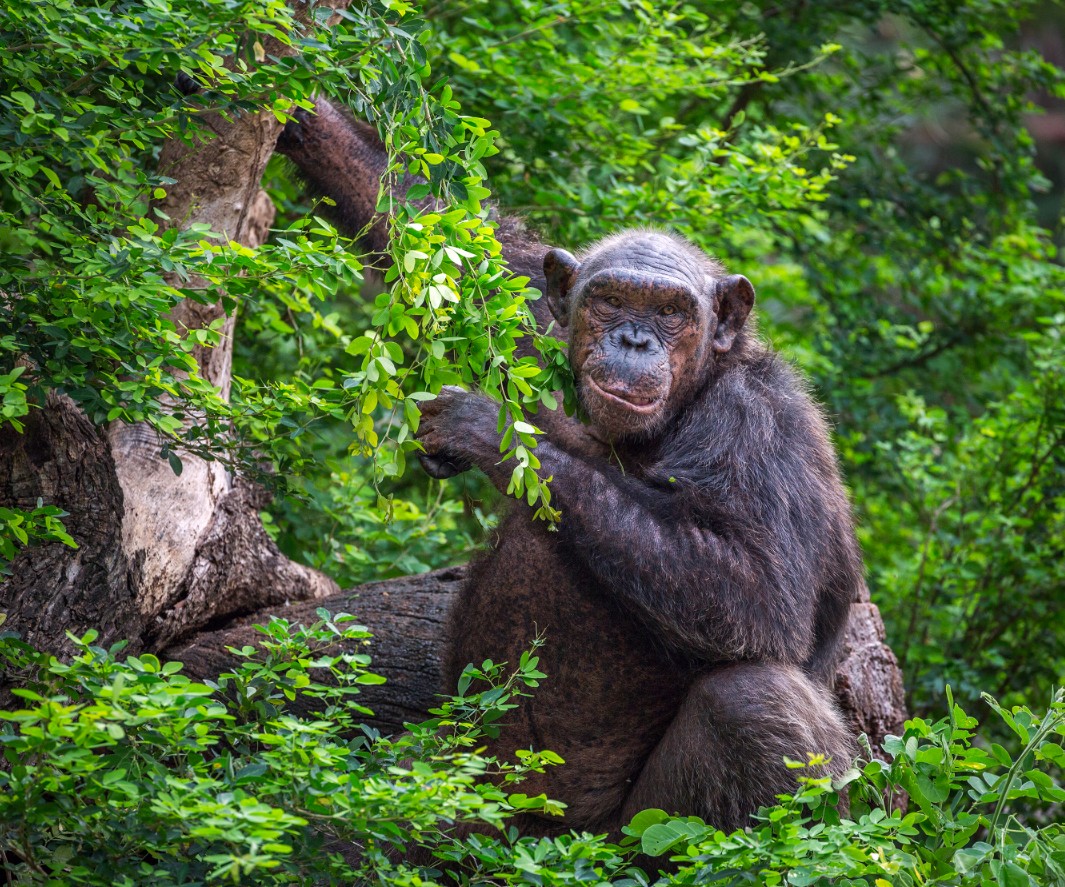Are Chimps Practically Human?
Many researchers suggest chimps should be considered part of humanity. Why do they think so, and where are they mistaken?

Could chimpanzees actually be considered human? A number of scientists argue they should be. For instance, in a recent article in 'Haaretz', this view was expressed by doctoral student Itai Rofman from the Institute of Evolution at the University of Haifa. Rofman has dedicated recent years to studying chimpanzees and bonobos (also known as 'pygmy chimpanzees'), and claims that based on his research, there's a significant case for including these apes within the human family.
To justify his argument, Rofman shared a story about Kanzi, a bonobo ape he found crying one day. "He showed me his hand, ran to the computer screen, pointed to words like 'pipe', 'hand', and 'hit', and demonstrated with hand gestures. It turned out that years earlier, he had sprayed water and upset one of the reserve's night guards, who hit him on the hand with a metal pipe. Kanzi remembered the event, which he likely experienced as traumatic, and was able to communicate it to me without having seen it happen before." Kanzi's sister, Panbanisha, displayed no less intelligence: using a computer and a vocabulary of 400 different symbols, she explained to Rofman how an ape that was the father of her children was anesthetized for a fracture treatment, suffered cardiac arrest, and underwent an unsuccessful resuscitation attempt.

The idea that chimpanzees deserve to be considered human isn't so radical, startling as it may sound to rational ears. In 2011, a chimp named Santino from the Furuvik Zoo in Sweden made international headlines after his keepers discovered his rare planning ability: he would gather stones into a small pile early in the morning before the zoo opened, to have a supply of stones ready to throw at visitors who annoyed him. This behavior, scientists argued at the time, proves that chimpanzees possess a 'well-developed consciousness' and an 'inner world like that of humans'.
Such developments in chimp research don't remain within the realm of theoretical science alone. Rofman mentioned in an interview with 'Haaretz' that he has been contacted by attorney Steven Wise, the leader of the 'Nonhuman Rights Project'. Wise is spearheading a high-profile campaign demanding legal rights for animals with advanced cognitive abilities, primarily chimpanzees, as entities with legal rights and equal status under the law. As part of their efforts, the organization is trying to gather evidence that chimpanzees could provide admissible testimony in courts. Rofman's stories of Kanzi and Panbanisha have certainly caught the organization's attention.
Efforts to grant human rights to chimpanzees have already started reaching U.S. courts. Last summer, a case was heard in a Manhattan court regarding the 'Nonhuman Rights Project's lawsuit to grant human rights to two chimpanzees named Leo and Hercules, currently housed at the Stony Brook University research lab. Attorney Wise argued that the U.S. Constitution should protect the rights of chimpanzees as well, as they are nearly identical to humans. "Chimpanzees are autonomous beings, making decisions for themselves and not controlled by instinct," Wise stated in court. "They are self-aware, possess a language, have mathematics, and a social culture. They remember the past and plan for the future." In humans, he summarized, such traits are the basis for the right to freedom – and the same should be true for chimpanzees.
Even though this lawsuit was ultimately rejected last July, similar cases are pending. Research like Rofman's provides them with the moral foundation: if chimpanzees indeed behave so much like humans – are they not essentially humans entitled to full rights within society?
Scientists who aren't so quickly swayed by a crying chimp have their own clear answers to this question. Chimpanzees, they remind us, do share 98% of their DNA with humans – but mice also share 90% of their DNA with humans, and yet we haven't heard of a cat that preyed on a mouse being charged with crimes against humanity. A shared genetic load – as long as it's incomplete – is simply not a basis for classification in the same category. Even 50% of a banana's DNA is identical to human DNA – something to ponder next time you slice up a fruit salad.
Even the claim regarding chimpanzees' impressive communication abilities isn't entirely convincing, especially when reminding ourselves that other animals also demonstrate not-insignificant capabilities in this area. Dogs can learn to perform a series of tricks in a certain order, understand sign language, and recognize quite a few words. Dolphins communicate with each other and humans using images, sounds, and signs. Even if the chimpanzee is the star student in the animal kingdom class, it doesn't mean students that excel slightly less should still be considered animals while he gets to be called 'human'. We must also remember that animals aren't the only ones besides humans capable of demonstrating communication, memory, and future planning abilities. As the science of artificial intelligence advances, there are quite a few computers that can do similar things. It's only fitting that after chimpanzees are declared human, our computers might start demanding their rights too.
It's unlikely any court will recognize the human rights of chimpanzees in the foreseeable future. But it's interesting to understand why the call to acknowledge the 'humanity' of chimps comes particularly from evolution researchers. Believers in Darwin's theory assert that humans originated from apes. From this belief, it's not a big leap to re-include today's apes back into the human family. However, in a demonstration of the full problematic nature of evolutionary theory, researchers supporting chimpanzee humanity completely overlook the essence of 'humanity'. Does being human mean being able to tell a story, plan a stone throw, or remember an event? If so, indeed there's little difference between chimpanzees and humans. At most, humans are just slightly more sophisticated chimpanzees. But if one starts from the assumption that humans have a uniqueness beyond intelligence and communication, endowed with a spiritual soul capable of moral thoughts that no animal or computer is expected to show, the whole issue becomes absurd. Yes, Kanzi the ape could recount that he sprayed water on a reserve worker – but was he also capable of regretting it, apologizing, and working on himself so as not to burst out like that in the future?

